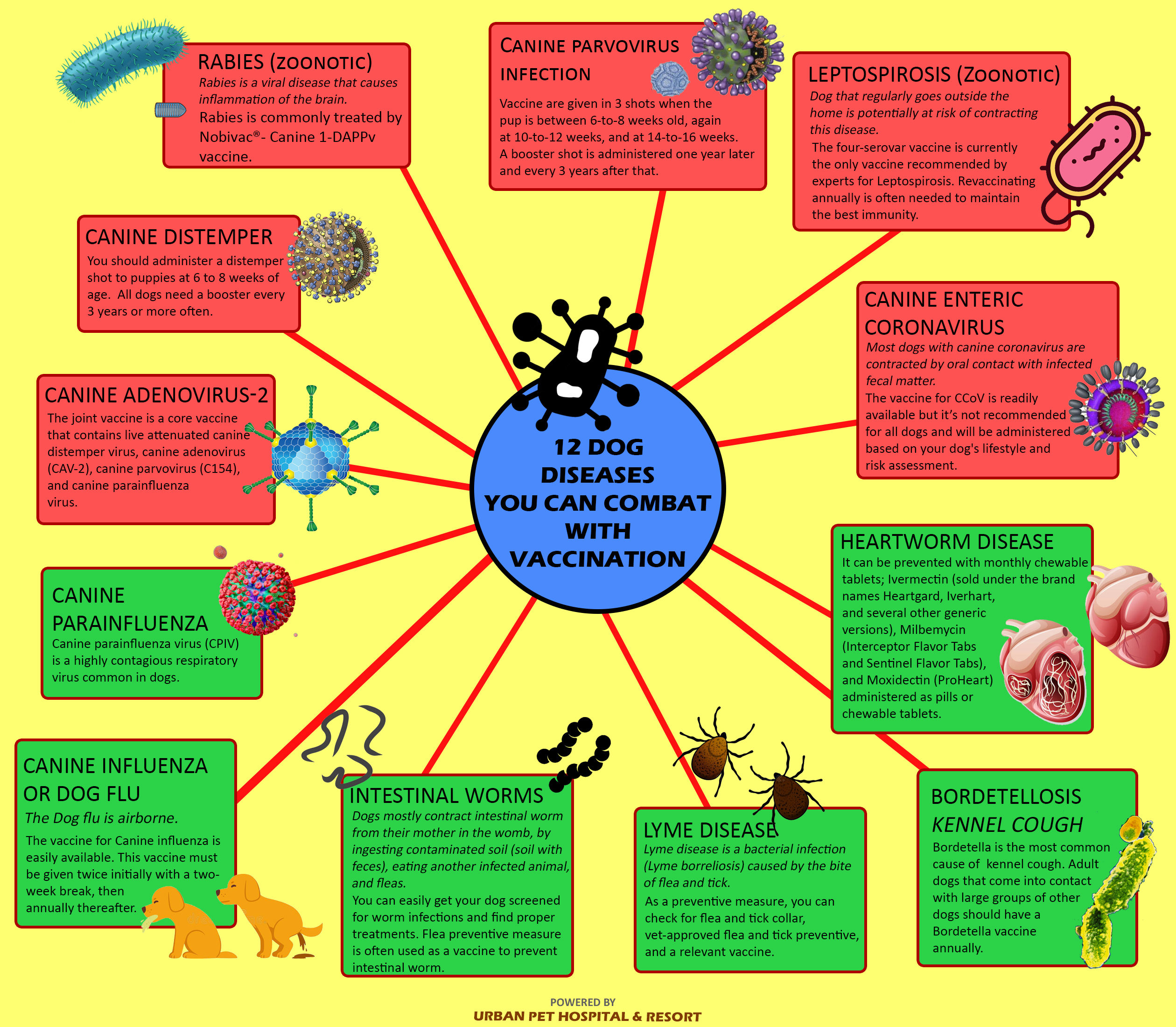
Canine vaccination is as important as human vaccinations. It not only helps to keep the serious disease on the bay but also protects your dog’s immune system. Each state in the US has its own law regarding canine vaccination with the exception of Rabies. The vaccination for rabies is mandatory in all states. You can be sure that like Rabies, you can prevent other serious diseases by administering vaccination to your dogs.
Why Canine Vaccination is Important?
Vaccines contain antigens that mimic disease-causing organisms in a dog’s immune system. It prepares a dog's immune system to defend itself from any invasion of the disease-causing organisms. The antigen mildly stimulates the immune system of the dog by having it recognize its presence.
The American Animal Hospital Association's Canine Task Force considers the following dog vaccinations to be core:
- Canine Parvovirus
- Canine Distemper
- Hepatitis
- Rabies
The non-core canine vaccines, but still important, include
- Bordetella
- Canine Influenza (dog flu)
- Leptospirosis
- Lyme vaccine
12 Dog Diseases that can be prevented with Vaccine
Here is the list of 12 dangerous canine diseases that can be prevented by timely vaccination.
Rabies (Zoonotic in nature)
Rabies is a viral disease that causes inflammation of the brain. It’s primarily passed to dogs through a bite from an infected dog or wild animals such as bats, raccoons, skunks, foxes, etc. It can easily transmit through a scratch or when infected saliva makes contact with mucous membranes or an open, fresh wound.
Rabies is commonly treated by Nobivac®- Canine 1-DAPPv vaccine, a modified live virus vaccine for the vaccination of healthy dogs as an aid in the prevention of disease caused by canine distemper virus, adenovirus type 1 (hepatitis), and adenovirus type 2 (respiratory disease), canine parainfluenza virus, and canine parvovirus.
The only remedy for rabies is the proper vaccination. Dogs should be vaccinated between 3 and 6 months of age. They need a booster one year from that date. They’re generally vaccinated every three years.
Canine parvovirus infection ("parvo")
Parvo is a highly contagious virus that causes an infectious gastrointestinal (GI) illness in puppies and young dogs. The deadly virus spreads either by direct contact with an infected dog or through feces. The Parvovirus can survive at room temperature for months hence it can easily transmit to dogs. Check for telltale signs such as bloody diarrhea, lethargy, anorexia, fever, vomiting, etc. in dogs.
Vaccines for the parvovirus are recommended for all puppies and are usually given in a series of three shots when the pup is between 6-to-8 weeks old, again at 10-to-12 weeks, and at 14-to-16 weeks. Like rabies, a booster shot is administered one year later and every 3 years after that.
Vaccines for the parvovirus are recommended for all puppies and are usually given in a series of three shots when the pup is between 6-to-8 weeks old, again at 10-to-12 weeks, and at 14-to-16 weeks. Like rabies, a booster shot is administered one year later and every 3 years after that.
Canine distemper
Canine distemper is a viral disease caused by a virus that attacks the respiratory, gastrointestinal, and nervous systems of dogs. It not only affects dogs but also wild animals. It’s a contagious and serious disease that can easily transmit from wild animals to dogs.
Puppies and dogs most often become infected through airborne exposure (through sneezing or coughing) to the virus from an infected dog or wild animal. Infected dogs often develop watery to pus-like discharge from their eyes followed by a fever, nasal discharge, coughing, lethargy, reduced appetite, and vomiting.
You should administer a distemper shot to puppies at six to eight weeks of age. All dogs need a booster every 3 years or more often.
Leptospirosis (Zoonotic in nature)
Leptospirosis is caused by spiral-shaped bacteria called leptospires that live in water or warm, wet soil. Initial signs of leptospirosis in dogs include fever, lethargy, and lack of appetite. Experts say that any dog that regularly goes outside the home is potentially at risk of contracting this disease.
It takes about 4-12 days for the bacteria to incubate. The four-serovar vaccine is currently the only vaccine recommended by experts for Leptospirosis. Revaccinating annually is often needed to maintain the best immunity.
Canine adenovirus-2
Canine adenovirus type 2 (CAV-2) is related to the hepatitis virus, canine adenovirus type 1 (CAV-1). It leads to recessive or mild respiratory tract infections and may cause infectious laryngotracheitis and symptoms of pneumonia. It’s also one of the causes of infectious tracheobronchitis, also known as canine cough.
The joint vaccine is a core vaccine that contains live attenuated canine distemper virus, canine adenovirus (CAV-2), canine parvovirus (C154), and canine parainfluenza virus. A joint vaccine is commonly administered to dogs to prevent CAV-2 infection.
Canine parainfluenza
Canine parainfluenza virus (CPIV) is a highly contagious respiratory virus common in dogs. It may develop in situations where large groups of dogs are close together for a period of time. CPIV is also one of the most common pathogens of infectious tracheobronchitis, also known as canine cough. It shouldn’t be mistaken with kennel cough. Although the respiratory signs may resemble those of canine influenza and CAV-2, they are unrelated viruses and require different vaccines for protection.
Canine enteric coronavirus
Canine coronavirus (CCoV) is an enveloped, positive-sense, single-stranded RNA virus which is a member of the species Alphacoronavirus 1. Most dogs with canine coronavirus are contracted by oral contact with infected fecal matter. A dog may also become infected by eating from contaminated food bowls or by direct contact with an infected dog.
Be wary, canine coronavirus (CCoV) is not the same virus as SARS-CoV-2 that causes COVID-19. Hence, the vaccine for CCoV should be used for treating COVID-19. The vaccine for CCoV is readily available but it’s not recommended for all dogs and will be administered based on your dog's lifestyle and risk assessment.
Canine influenza
Canine influenza or Dog Flu is influenza occurring in dogs that are caused by varieties of influenza virus A, such as equine influenza virus (H3N8). The Dog flu is airborne; respiratory secretions escape into the environment in the form of coughing, barking, and sneezing, where they are then inhaled by a new canine host.
The vaccine for Canine influenza is easily available. This vaccine must be given twice initially with a two-week break, then annually thereafter.
Lyme disease
Lyme disease is a bacterial infection (Lyme borreliosis) caused by the bite of flea and tick. The ticks that carry Lyme disease are especially likely to be found in tall grasses, thick brush, marshes, and woods. They easily jump into your dog’s coat.
The most common signs of Lyme disease include fever, loss of appetite, painful or swollen joints. The treatment includes antibiotics, usually for at least 30 days. As a preventive measure, you can check for flea and tick collar, vet-approved flea and tick preventive, and a vaccine.
Bordetellosis ("kennel cough")
Bordetella is the most common cause of kennel cough. Bordetella bronchiseptica is a bacterium that is associated with respiratory disease that causes inflammation of the trachea and bronchi.
The symptoms include a hacking cough, retching, sneezing, watery nasal discharge, pneumonia, inappetence, fever, etc.
Adult dogs that come into contact with large groups of other dogs should have a Bordetella vaccine annually.
Heartworm disease
Known as Dirofilaria immitis, the heartworm or dog heartworm is a parasitic roundworm that looks like a small thread-like creature. It spreads from the bite of an infected mosquito.
The symptoms include soft and dry cough, lethargy, weight loss, anorexia, difficulty in breathing, etc.
It can be prevented with monthly chewable tablets; Ivermectin (sold under the brand names Heartgard, Iverhart, and several other generic versions), Milbemycin (Interceptor Flavor Tabs and Sentinel Flavor Tabs), and Moxidectin (ProHeart) administered as pills or chewable tablets.
Intestinal worms (roundworms, hookworms, whipworms, tapeworms, etc., some of which can also infect people)
The intestinal worm is common in dogs. There are various kinds of worms contracted by dogs over their lifetime. They mostly contract it from their mother in the womb, by ingesting contaminated soil (soil with feces), eating another infected animal, and fleas.
We have a detail information on infographics as well:

You can easily get your dog screened for worm infections and find proper treatments. Flea preventive measure is often used as a vaccine to prevent intestinal worm.
Urban Pet Hospital & Resort is the best pet hospital in Des Moines. Our certified veterinarian can help you with all the questions regarding canine vaccines and preventive measures for healthy dog life.